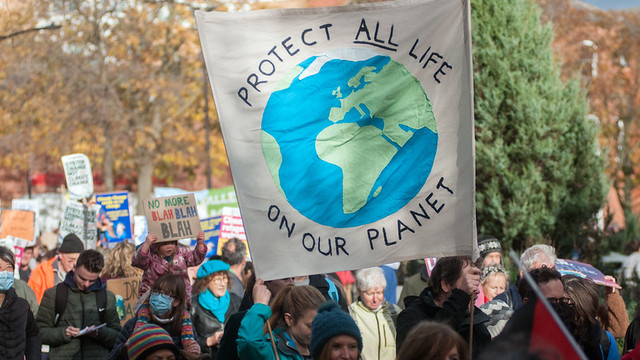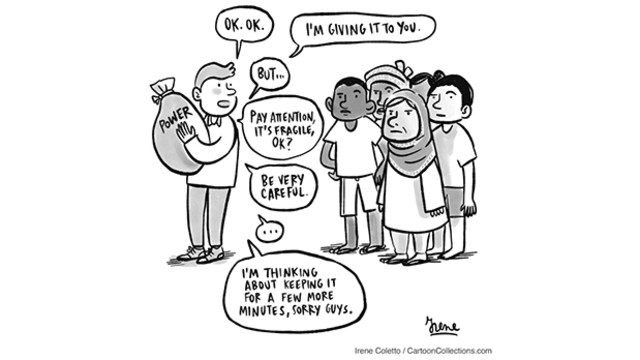Sounding the alarm: new IPCC report reinforces urgency for G20 to take stronger climate action
The science in the new IPCC report paints a clearer picture than ever before – the climate crisis is here, and we must act fast. With COP26 looming, Andrew Norton calls on G20 leaders to listen to the report’s findings and step up their climate action.


Massive fires, including those recently in the US and across parts of Europe, are a real-life example of the climate crisis outlined in the IPCC report (Photo: Felton Davis via Flickr, CC BY 2.0)
The new report from the Intergovernmental Panel on Climate Change (IPCC) – the UN panel of experts who carry the responsibility of synthesising knowledge and key messages from the most credible sources of climate science − comes at a critical moment: with three months to go to the COP26 summit in Glasgow, extreme weather events are wreaking havoc globally including across Europe, China, India, Siberia and the United States.
The piercing wake-up call we need
The report is stark but unequivocal: widespread and rapid changes in the climate driven by warming caused by greenhouse gas emissions from human activity are causing accelerating disruption in every region across the world.
The five CO2 emissions scenarios outlined in the report are especially revealing. The five potential pathways – ranging from a future with ambitious emissions cuts to carrying on business-as-usual – show that global warming of 2°C above 1850-1900 levels, the upper limit set by the Paris Agreement, will be exceeded during the 21st century unless deep reductions in CO2 and other greenhouse gas emissions occur in the coming decades, with an immediate step change to that effect.
The report outlines where we are headed in terms of global temperatures. Even under the least damaging scenario, the best estimate involves temperatures exceeding the critical 1.5°C guardrail in the middle of the century before dropping under that level by 2100.
The other options, frankly, don’t bear thinking about.
Keeping hope: limiting warming to 1.5°C is still within reach
While the report makes for sober reading, it is the war cry we need world leaders to hear. There must be deep and rapid reduction in greenhouse gas emissions, starting now.
The IPCC’s Special Report on 1.5°C made it clear that the consequences of exceeding that level of warming will be severe – a fact underscored dramatically by the recent wave of extreme weather events at our current level of around 1.2°C.
The IPCC's new report shows the 1.5°C goal is not lost − we can still get there, but we need to act fast. As I discussed in a recent blog, G20 and ministerial-level meetings over the past month showed promise, with governments putting more political weight behind the 1.5°C goal.
This new report from the IPCC should add to this resolve by world leaders which is critical for vulnerable countries most affected by the changes in the climate.
Reinforcing the need for adaptation and attention for loss and damage
While much of the public reaction to the report has been on how we can mitigate the worst impacts of climate change, the report has an important message on adaptation and loss and damage: it reiterates that no matter which scenario you look at, the stock of greenhouse gases already locked into the system is already causing widespread devastation and will continue to do so regardless of rapid decarbonisation efforts.
The report states that past emissions have already led to unavoidable future changes in ocean temperature and sea level rise – these changes are irreversible on centennial to millennial time scales. With further global warming, every region will increasingly experience climate impacts – with impacts more widespread at warming of 2°C than 1°5C and even more widespread and pronounced for higher warming levels.
This is a timely reminder of the need to increase support and finance for adaptation and to step up financial and technical support for vulnerable countries experiencing loss and damage.
Pressure mounts on G20 countries to step up
These IPCC reports are hugely significant – they are signed off by 195 national governments, with their technical experts contributing to it, reviewing it and shaping it. These governments cannot look at this report and disregard it – they have helped develop it. And the messages within it will also stimulate social movements and climate activists to redouble their cries for radical change.
The report reiterates the urgent need for G20 countries to step up – to submit more ambitious NDCs, as agreed at their recent G20 meeting in Italy, and to make long-term strategies for rigorous decarbonisation of economies a mandatory requirement – all before COP26.
Rapid phase out of coal power and ending coal finance need more ambitious action from G20 countries than we are currently seeing, as does the ending of public subsidies to fossil fuel industries.
Even the traditionally cautious International Energy Agency has called for an immediate stop to all new fossil fuel supply projects as part of its proposed pathway to a global energy system with net zero emissions by 2050.
Further, the climate finance delivery plan to reach the promised US$100bn per year being developed by Germany and Canada is a welcome move, but the plan needs to be believable. Climate-vulnerable countries have waited long enough for this support and, as the science shows, continue to suffer the impacts of climate change in the meantime.
The science speaks for itself
The IPCC report is a reminder of the systemic challenge of the climate crisis and its far-reaching impacts. The need to address this challenge requires a multi-pronged approach – that looks at the interlinkages with nature and biodiversity, energy, transport, urban development, livelihoods, social justice and much more.
The report’s findings come at a critical moment in this ‘super year’ journey. World leaders must listen to the science − the decisions they take this year will be make or break for climate, nature and people in the coming decades. Science must inform that legacy.



